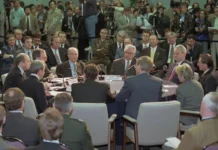Opening Remarks and Context
In the recent gathering of the IAEA Board of Governors, a significant milestone was achieved with the welcoming of Timor-Leste’s application for membership. This application marks a pivotal and symbolic expansion of the IAEA, reflecting the organization’s ongoing commitment to inclusivity and its comprehensive mandate. The International Atomic Energy Agency (IAEA) has been recognized by the United Nations as a crucial entity in promoting the responsible use of nuclear technology, making this development particularly noteworthy. It emphasizes the belief that embracing new member states contributes to a shared vision of global peace and security.
The IAEA plays an instrumental role in various dimensions that extend beyond nuclear non-proliferation. Among its core responsibilities, the agency is dedicated to enhancing international cooperation in the peaceful application of nuclear energy and materials. Timor-Leste’s accession to the IAEA can enhance collaboration in development initiatives, paving the way for sustainable energy solutions that address the unique needs of emerging nations. Moreover, the IAEA’s portfolio includes diverse priorities, from addressing the pressing challenges of nuclear safety and security to providing technical assistance in health and agriculture sectors through radioactive technologies.
As we navigate through an era marked by complex geopolitical landscapes and emerging global challenges, the role of the IAEA remains increasingly vital. By fostering a cooperative framework among member states, the agency contributes towards mitigating the risks associated with nuclear proliferation while facilitating the peaceful employment of nuclear science and technology. It is within this context that the current meeting serves as a platform for addressing ongoing achievements and hurdles, reinforcing the imperative for collaborative efforts in safeguarding the future.
Nuclear Safety and Security in Conflict Zones
The current situation in Ukraine remains a focal point for nuclear safety and security, particularly concerning the Zaporizhzhya nuclear power plant (ZNPP). Following a significant blackout that challenged the plant’s operational integrity, the International Atomic Energy Agency (IAEA) facilitated critical repairs, which were essential to restoring normal operations. Despite these efforts, the ongoing fragile conditions surrounding the ZNPP highlight the precariousness of nuclear safety in conflict zones. The IAEA’s principles of nuclear safety and security must be adhered to, but compliance remains a significant concern amidst the surrounding instability.
Currently, the Zaporizhzhya plant is navigating multifaceted challenges that underscore the urgent need for a reliable long-term cooling water solution. Implementing this solution is crucial for maintaining safe reactor operations and protecting the plant from external threats. Additionally, monitoring the operational status of other Ukrainian nuclear power plants is imperative. The continuous assessment of safety measures within these operational facilities is essential for preventing potential incidents that could arise due to non-compliance with established safety standards.
Furthermore, the repairs undertaken at Chornobyl site must not be overlooked. The IAEA has been actively involved in restoring safety measures at this facility, where historical concerns still persist. Outside of Ukraine, the IAEA has resumed its inspections in Iran, where questions about compliance and transparency of nuclear activities are ever more pressing. The ongoing discrepancies in Iran’s nuclear program raise significant red flags regarding adherence to international safeguards.
At the same time, developments in North Korea warrant attention. Persistent violations of United Nations Security Council resolutions relating to its nuclear activities underscore a growing concern that the international community must address. The implications of such actions extend beyond regional security and pose risks to global nuclear safety as a whole.
Challenges and Concerns in Nuclear Oversight
The recent Board of Governors meeting has underscored several pressing challenges in nuclear oversight, particularly concerning Iran and North Korea. One of the main issues eliciting concern is Iran’s insufficient cooperation with the International Atomic Energy Agency (IAEA). The agency has repeatedly called for transparency and timely reporting on the status of Iran’s uranium inventories. However, delays in providing access to this critical information undermine the verification processes essential to ensure compliance with the Joint Comprehensive Plan of Action (JCPOA) and promote nuclear non-proliferation.
Moreover, the IAEA has faced significant obstacles in gaining access to key facilities that are pivotal for comprehensive oversight. These access delays not only hinder the agency’s ability to monitor Iran’s nuclear activities but also raise alarms about potential undisclosed operations that may contravene international treaties. The lack of cooperation from Iran poses a considerable risk to regional stability and broader international security, emphasizing the urgent need for diplomatic engagement to restore trust and compliance.
Turning to North Korea, the situation appears equally alarming. The IAEA’s assessments indicate a troubling expansion of North Korea’s nuclear capabilities, particularly concerning the ongoing operations of its reactors. There have been indications that preparations for potential nuclear testing are underway, which could destabilize the geopolitical landscape further. These developments serve as a stark reminder of the complexities surrounding nuclear oversight in areas where accountability is paramount.
Given these challenges, it is imperative for the international community to reinforce commitments to accountability and compliance with existing resolutions. Enhanced dialogue and cooperation among member states are essential for addressing these concerns effectively, ensuring that the framework for nuclear oversight remains robust and responsive in the face of evolving threats.
Promoting Peaceful Uses of Nuclear Technology
The International Atomic Energy Agency (IAEA) plays a pivotal role in promoting the peaceful applications of nuclear technology, emphasizing its importance in fostering global development while ensuring safety and security. Through various technical cooperation initiatives, the IAEA supports member states in harnessing nuclear technology for a wide array of purposes, including health care, agriculture, and environmental management. By facilitating access to nuclear knowledge and resources, the IAEA enables countries to utilize nuclear science effectively while adhering to safety protocols.
One key area of focus is the enhancement of agriculture through nuclear techniques. The use of radiation to develop high-yield and disease-resistant crops has been instrumental in improving food security, especially in regions facing agricultural challenges. Furthermore, nuclear technology plays a vital role in disease control, where radiation is used for pest management, positively impacting crop productivity. Such endeavors not only address immediate agricultural needs but also contribute to long-term sustainability and resilience against climate change.
In addition to agricultural applications, the IAEA’s work in the medical field is noteworthy. Various nuclear techniques, such as medical imaging and cancer therapy, are crucial advancements in health care. By improving access to these technologies in developing countries, the IAEA aims to bridge health disparities and ensure that nuclear technology serves as a tool for enhancing public health outcomes.
The collaborative framework established by the IAEA promotes dialogue and information sharing among member states, allowing for best practices and innovations in nuclear research and development. By enhancing partnerships, the IAEA encourages the safe exchange of nuclear technology that aligns with sustainable development goals. Such initiatives strengthen collective efforts to ensure that nuclear advancements contribute positively to global challenges, further solidifying the essential role of peaceful nuclear technology in addressing fundamental societal needs.



